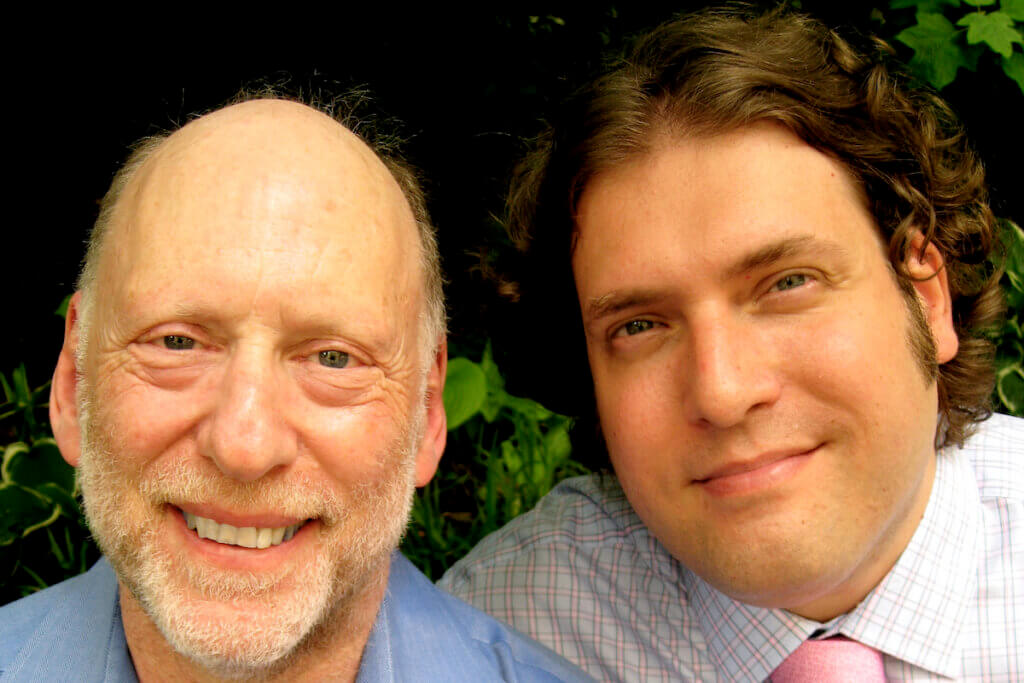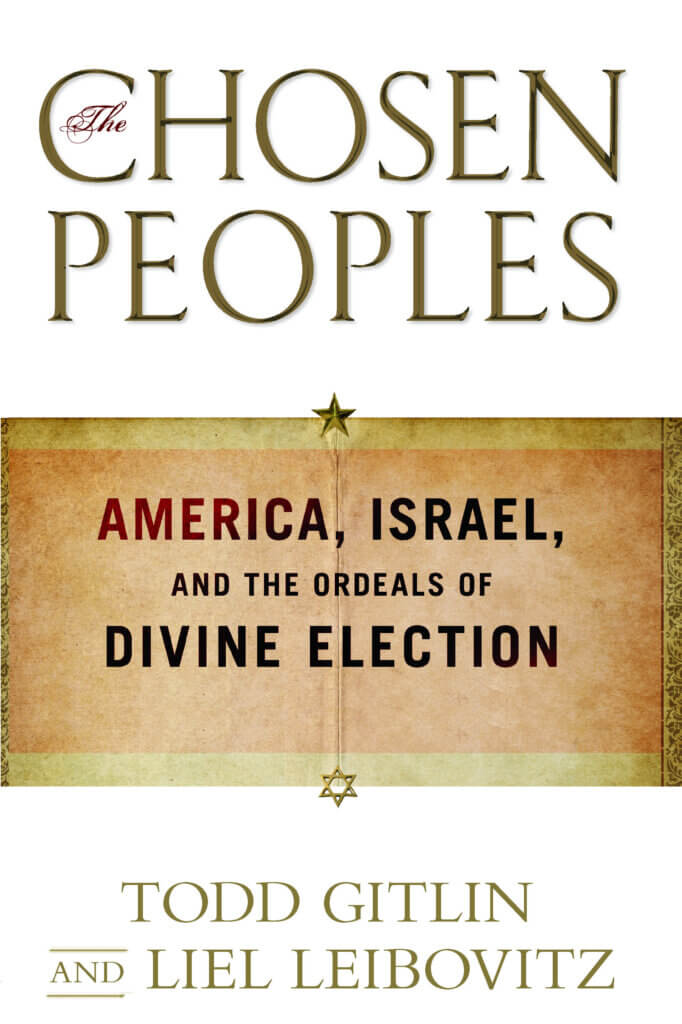THE CHOSEN PEOPLES
America, Israel, and the Ordeals of Divine Election
by Todd Gitlin and Liel Leibovitz
272 pp. Simon & Schuster $17.99
Readers may remember the Jewish novelist Michael Chabon’s strange article in the New York Times days after the Mavi Marmara debacle. In his op-ed, “Chosen, but Not Special“, Chabon claims that recent evidence of Israeli “stupidity”, namely the massacre of civilians in international waters, should put an end to the illusion that Jews are somehow more enlightened than others; an illusion which, Chabon hastens to add, has done the Jewish state no favors. Paradoxically, Chabon points out, Israel claims to be a “light unto nations”, yet protests loudly against those who hold Israel to a “higher standard” than other states. Of course, Chabon provides no evidence of those who hold Israel to a “higher standard”, as virtually all diplomatic reaction to the Mavi Marmara affair bitterly criticized Israel’s behavior not because it fell short of some lofty theological ideal, but because it was an egregious violation of international law. Certainly a comparative framework was used to highlight Israeli lawlessness, but for most commentators it was the real-world precedent of Somali piracy that proved germane. I do not recall anyone arguing that Jewish “chosenness” was the proper standard by which Israeli behavior should be judged.
Nevertheless, Chabon’s argument that Jews should basically eschew the idea of their essential uniqueness caused predictable reaction. Todd Gitlin and Liel Leibovitz, authors of the new book The Chosen Peoples: America, Israel, and the Ordeals of Divine Election, responded in the online magazine Tablet with an article entitled “the Centrality of Jewish Chosenness“. Gitlin and Leibovitz argue that a renunciation of Jewish chosenness is not only implausible, but also undesirable. To them, chosenness is “foundational”; for who are the Jews, they ask, “if not people that believe that their ancestor [Abraham] was singled out…by God?” Indeed, Jewish chosenness is not simply a central aspect of Judaism, but to Gitlin and Leibovitz, its rasion d’etre: “In a way”, Gitlin and Leibovitz write, “the Jewish people have invented the idea of chosenness, but in truth, chosenness has invented the idea of the Jewish people. Such is Judaism’s wonderfully inverted logic: First comes redemption, only then reasons.”
Whatever the theological merits of Gitlin and Leibovitz’ argument, a reader of their article might be somewhat puzzled by the subtitle of their new book. “America, Israel and the Ordeals of Divine Election”? How can the “rich and strange idea” of chosenness, as the author’s call it in their Tablet article, be so problematic? Certainly it is seductive enough to be embraced by two admittedly secular writers like Gitlin and Leibovitz. The “ordeal”, then, must be the experience of the other side—those who have had the unlucky fortune, from the Bible onwards, to get in the way of the both the chosen people and the “almost chosen people”, as Abraham Lincoln famously labeled the Americans.
Yet the reader of The Chosen Peoples quickly discovers that the “ordeal” is, in fact, essentially our own. True, Gitlin and Leibovitz do discuss the unfortunate effect the idea of “divine election” has had on the lives of the “unchosen”. And they do set up the useful, if not exactly novel, analogy between American treatment of the indigenous population and Israeli behavior in the Occupied Territories. But Gitlin and Leibovitz are careful not to push things too far, and eagerly mitigate whatever negative conclusions the reader might come to about the idea of “divine election”. Thus, for those of us who had the good fortune to learn about the postmodern concept of the “contrapuntal” in Comp Lit class, we know what Gitlin and Leibovitz mean when they tell us that “[t]he chosen and unchosen are entangled together by resentment and resignation, mercy and anger, humor and heartbreak, cacophony and harmony.” But if that’s not exactly clear to the reader who has just read about one-sided land theft and expropriation (the authors avoid, in their discussion of American Indians, the issue of genocide), Gitlin and Leibovitz further remind us that “the relationship between the chosen people and those whom they dispossess…is partly an extended war dance, but it is also a sequence of movements, sometimes slow, sometimes stormy, in which the vanquished, while never triumphant, nonetheless help determine the rhythm of history.” I’m sure the remaining descendants of American Indians and present-day Palestinians in refugee camps will take comfort in this discovery of their role in history. Current students of Gitlin’s at Columbia University’s School of Journalism, however, might want to start working on their term papers as soon as possible.
Keeping to the theme of the “extended war dance”, Gitlin and Leibovitz show us that the “unchosen” are also susceptible to the same Manichean worldview as the “chosen”. The authors denounce the influence of Frantz Fanon’s The Wretched of the Earth and its impact on the “third-worldist left”, the Palestinians in particular. “Hapless when Israel crushed the Arab armies in 1967″, Gitlin and Leibovitz inform us, these ‘victims of the victims’, as [Edward] Said called the Palestinians, were now ready-made to be cast as the wretched whose destiny—manifest destiny, one might have said—under Yasir Arafat was to inherit the occupied earth.” Thus the playing field is essentially leveled, as the Palestinian quest for statehood in their historic homeland is shown to be not entirely different from American expansionism abroad. For good measure, the authors also distance themselves from Noam Chomsky, “who has for decades been so exercised by American and American-sponsored power and violence as to overlook or minimize or explain away the depredations committed by others.” Of course, no evidence is given to support this accusation, but the contour of the argument is clear: that in the “obsessive hatreds” of America and Israel (never enumerated), the authors hear “not so much love for justice, or the dispossessed, as the curses cast by Paul and Mohammad at their most unforgiving, the faith and fury that herald the passing of the mantle of chosenness from some of God’s children to others.” Present-day examples of this phenomenon aren’t given.
If all this seems somewhat convoluted, it isn’t surprising, because a clear assessment of the historical record is not Gitlin and Leibovitz’ objective. Indeed, what useful history is in the book is merely a prelude to what Gitlin and Leibovitz call their “unexpected conclusion”, which is essentially that the United States and Israel must embrace the idea of chosenness “in a different key”. In their Tablet article, the authors claim they set out to write a book challenging the idea of chosenness, whether Jewish or American. I very much doubt this was their intention, for throughout The Chosen Peoples, Gitlin and Leibovitz can only wax grandiloquent about “divine election”. In one place, we are told about “the deep power and exquisite beauty of divine election” and “the profound merits of chosenness”; elsewhere, despite its apparent “beauty”, we are told that chosenness has been “an ordeal, closer to a curse than a blessing” and that, for example, “contemporary Israelis groan beneath the ancient burden, compelled to make sense of chosenness, queasy about unchecked territorial expansion.” (Recent polls of Israeli public opinion, however, suggest that Israelis may be less reticent about expansion that Gitlin and Leibovitz like to believe). Whether good or bad, what these examples clearly point to is the fact that the authors fully subscribe to the reality of chosenness: how else to explain their studied avoidance, throughout the book, of words like “myth” and “illusion”?
Of course, Gitlin and Leibovitz, as proper bien-pensant intellectuals, cannot admit that they simply love the idea of “divine election”. To do so would be politically incorrect and embarrassing. Instead, they do what evasive people often do: they cast their advocacy in the language of analysis. “The clock cannot be reset to zero”, Gitlin and Leibovitz write; “we cannot choose to be unchosen”. Furthermore, “the cycles of race hatred, revenge, and war cannot be rescinded, erased from memory. History is unsparing”. This is why “it is no use trying to bludgeon the notion [of chosenness] into nonexistence”, which is fortunate given that it is an “extraordinary, entrancing, ancient [and] deep” notion to begin with. Thus the authors’ preferred conclusion is the inevitable one: “we must, like the Israelites of old, willingly bear the immense burden of membership in a tribe many of whom feel, and have long felt, chosen by God”. Gitlin and Leibovitz are speaking as Jews here; where this leaves America’s sense of “divine election” is anyone’s guess.
Finally, what are we to make of the attractiveness of “divine election” for secular intellectuals who are, on a day-to-day basis, otherwise committed to egalitarianism? Many years ago, in an essay for the now defunct journal Grand Street, Noam Chomsky sought to locate the appeal of the Protestant theologian Reinhold Niebuhr for postwar American elites, especially liberals. Unimpressed by the intellectual level of most of Niebuhr’s work, Chomsky found that Niebuhr’s influence lay elsewhere—namely, in his concept of “the paradox of grace”. “The paradox of grace” basically holds that Man’s actions are inevitably tainted by self-interest, yet in a world of sin, moral men must risk doing evil for the greater good. Chomsky quotes Niebuhr’s biographer Richard Fox, who notes that for Kennedy liberals, Niebuhr “helped them maintain faith in themselves as political actors in a troubled—what he termed a sinful—world…responsibility meant taking risks: Niebuhr taught that moral men had to play hardball.”
I would suggest that a similar appeal lies in “divine election”. Like the “paradox of grace”, we are encouraged by Gitlin and Leibovitz to assume a great deal of “responsibility”, which in turn obviates the need for accountability. Indeed, if we err, as Gitlin and Leibovitz admit we have done on occasion, it can always be attributed to the “afflictions of chosenness”—afflictions we may not have invited, but are nonetheless at a loss to undo. This is quite useful for those who fear a more unassuming role for America and Israel in the world— a role that, as the authors remind us over and over again, is basically inconceivable anyway. “Even if it were possible for the Jews of Israel to accept the modest project of living normally”, Gitlin and Leibovitz tell us, “it is hard to see how they can reconcile themselves to the belief that their new mission consists of getting by. Logically possible it might be, but psychologically? Not very likely.” In other words, there is no “exquisite beauty” to be found in abiding by international law, or showing, in the words of Thomas Jefferson, “a decent respect to the opinions of mankind.” Better to indulge in fantasies about a “burden to be gladly shouldered”, which, it should be clear to any reader relying on common sense, must obviously be no kind of burden at all—at least not for us, anyway.



